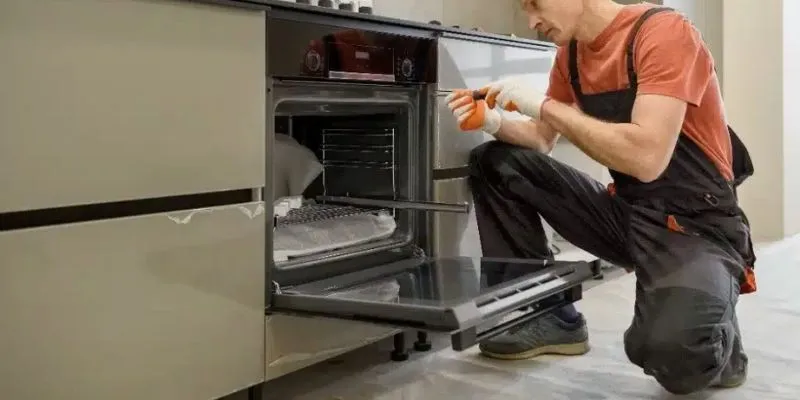Your dishwasher is supposed to make your life easier, not fill your kitchen with strange sounds. When it starts clunking, grinding, or rattling, it can be frustrating and concerning. A noisy dishwasher is often a sign that something is not working as it should. Identifying the cause early can help you avoid expensive repairs or even a complete breakdown.
In this guide, we will explore the common reasons your dishwasher might be making loud noises, how to fix them, and when it’s time to call in the professionals.
1. Obstructed Spray Arms
One of the most common culprits behind a noisy dishwasher is a blocked or loose spray arm. If dishes are stacked too high or an item falls through the rack, it can obstruct the spinning arms, causing them to hit objects while rotating. This often results in a loud knocking or banging noise during the wash cycle.
Solution: Check that the spray arms can spin freely. Remove any objects that may be blocking their path and make sure the arms are properly attached.
2. Worn-Out Pump or Motor Assembly
The motor and pump assembly are essential for circulating water through your dishwasher. Worn-out motor bearings or a damaged pump impeller can produce humming, grinding, or buzzing sounds during the dishwasher cycle. These parts can deteriorate over time due to age or mineral buildup.
Solution: Inspect the motor and pump area. If you’re unsure or notice visible damage, it’s best to get professional help to replace them.
| Pro Tip: If your dishwasher is over 8 years old and making grinding noises, it might be more cost-effective to replace the unit instead of repairing internal motor components. |
3. Loose or Damaged Mounting Brackets
Dishwashers are secured in place using mounting brackets. If these brackets come loose, the unit can vibrate excessively during operation, especially during the drain or spin cycles. This vibration may sound like rattling or even banging against nearby cabinets.
Solution: Inspect the brackets that attach your dishwasher to the cabinet or countertop. Tighten or replace any loose or damaged brackets.
4. Hard Objects in the Chopper Blade Area
Fork tines, bits of bone, or broken dishware can get lodged in the chopper blade area, causing a loud grinding noise. The chopper blade is designed to break down food particles before draining, but it cannot handle non-food items.
Solution: Unplug the unit and check the bottom of the dishwasher for debris. Gently take out any foreign items to avoid causing additional harm to the appliance.
5. Faulty Water Inlet Valve
If the dishwasher makes a loud humming or buzzing sound during the filling phase, the water inlet valve could be to blame. A failing valve may not open or close properly, creating noise and disrupting the water flow.
Solution: This part usually needs to be replaced. Because it involves your home’s water line, it’s best to call a professional technician.
6. Clogged Drain or Faulty Drain Pump
When water cannot drain properly, the drain pump might struggle to push it out, resulting in a loud gurgling or whirring noise. With regular use, leftover food and residue may build up and block parts of the system.
Solution: Clean the dishwasher filter and inspect the drain hose. If the noise persists, the drain pump may need replacement.
7. Loose or Worn-Out Bearings and Wash Arm Support
Bearings help reduce friction in moving parts like the spray arms. When these wear out, the arms may grind or squeak as they turn.
Solution: Check for loose or deteriorating bearings. In many cases, you can replace these parts separately rather than swapping out the whole spray arm.
8. Improper Installation or Leveling
If your dishwasher was not installed correctly or is sitting unevenly, it can lead to increased vibrations and noise. This is especially noticeable during the wash and drain cycles.
Solution: Use a level to check the alignment of your dishwasher. Adjust the leveling legs as needed so the unit sits flat on the floor.
9. Low Water Pressure or Blocked Spray Nozzles
Low water pressure can make the motor work harder, leading to unusual sounds. Similarly, blocked nozzles can interrupt the normal spray pattern, causing loud thuds and uneven operation.
Solution: Clean the spray nozzles and check your water supply for adequate pressure. Make sure filters are clean and water lines are clear.
| Pro Tip: Running a dishwasher cleaner through a full cycle once a month can prevent many of these problems by removing mineral buildup and grime. |
10. Aging Dishwasher Parts
Over time, even the best dishwashers begin to wear out. Seals, insulation, and internal components lose their ability to dampen noise. As the unit ages, it may naturally become louder during operation.
Solution: Regular maintenance can prolong your dishwasher’s life, but if noise becomes unbearable and repairs frequent, consider upgrading to a new energy-efficient model.
When to Call the Pros
If the noise persists after basic troubleshooting, it’s best to contact a qualified appliance repair technician for further inspection. Persistent noises often indicate deeper issues that require expert tools and experience.
Salt Life Appliance Repair delivers prompt, cost-effective, and dependable dishwasher repair solutions to bring quiet back to your kitchen. Whether it’s a faulty motor or an obstructed spray arm, their trained technicians can get your appliance running smoothly again.
Frequently Asked Questions
Q: Is it safe to use my dishwasher if it’s making strange noises?
A: Not always. While some noises may be harmless, others can indicate serious issues. Continued use might lead to greater damage.
Q: What’s the typical price to fix a loud dishwasher?
A: The cost can vary depending on the part needing repair. Minor fixes may cost between $100 to $200, while motor or pump replacement can be more expensive.
Q: Can I fix a noisy dishwasher myself?
A: Some issues like clearing spray arms or tightening brackets are DIY-friendly. For electrical or internal component issues, professional help is recommended.
Q: How often should I clean my dishwasher filter?
A: Ideally, clean the filter every two to four weeks to prevent clogs and noise from food particles.

